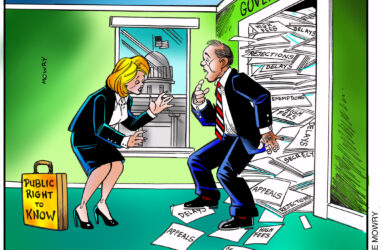
Dear Editor,
Finn J.D John’s column on old-time loggers and millworkers in the April 18 edition of The Creswell Chronicle sent my mind spinning with memories of early Northwest Scandinavian workers. Most rural Scandinavians from below the Arctic Circle spent winters logging with axes, crosscut saws, and hardwood wedges — usually no more than an hour’s ski or sled trip from home.
They were highly-skilled loggers and wood workers. My grandfather came to Seattle from Western Norway in 1908 and began working east of Seattle, cutting down massive old growth cedar from spring boards, which were often 10 feet above ground in two-man teams.
They slept on the wet ground next to the trees they were felling; some died of pneumonia or TB due to poor rations and cold, damp weather.
About that time NW woods workers began to self organize under the banner of the Industrial Workers of The World (IWW), nicknamed Wobblies. Within a short time they gained good food, warm bunkhouses, medical care, safety rules and more.
I also had the good fortune to attend a 1969 reunion of IWW shingle millworkers and survivors of the 1916 Everett Massacre. They told me of being beaten, burned out of homes and meeting halls, shot and jailed because they wanted rest breaks, safety guards and a shorter work day.
Their tough, stoic, determined unity was far more impressive to me than surviving injuries.
Those united working-class men and women secured safety, rest breaks and an eight-hour day, 40-hour workweek before there was legislation to that effect, in spite of the economic might of the employing class and the power of oppressive government.
The IWW, organized in 1903, was the first union to welcome women, people of color and immigrants; their self organized and direct action methods secured safety, income, free speech, and free time we take for granted today.
In the 1920s, the employing class in collusion with our own government destroyed IWW union halls, murdered, deported and jailed many members, knocking the wind out of the most democratic, self-directed union the country had ever seen.
As a consequence, labor rights and conditions in many other countries continued to improve to the point where most European workers are more secure, healthier and happier than American workers. Fortunately, the IWW survived and continues to inspire other unions and works to help disrespected, underpaid workers self organize.
I consider paying dues to the IWW, although retired, and paying my taxes as the most meaningful patriotic acts I can practice. Taxes provide my neighbors with protection, schools, roads and other infrastructure, union dues protect and improve the lives of fellow workers.
Movies to Go and the Creswell Library should still have the DVD “Wobblies” about the early history of the union. One may also visit iww.org for historical and current information.
Ed Gunderson
Creswell







